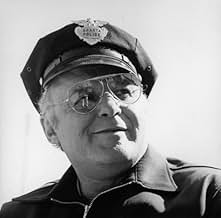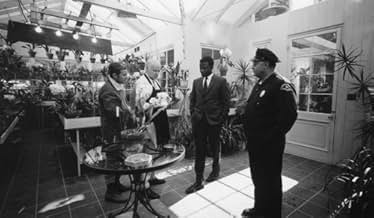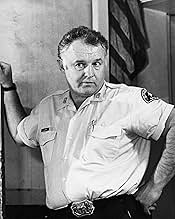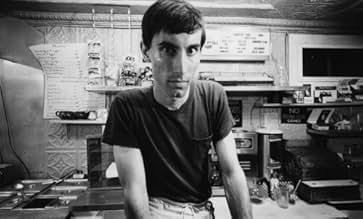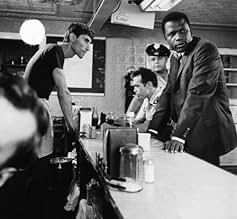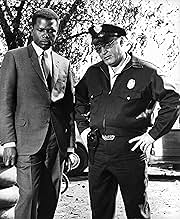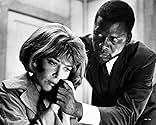Um detetive da polícia negro é convidado a investigar um assassinato em uma cidade do sul racialmente hostil.Um detetive da polícia negro é convidado a investigar um assassinato em uma cidade do sul racialmente hostil.Um detetive da polícia negro é convidado a investigar um assassinato em uma cidade do sul racialmente hostil.
- Ganhou 5 Oscars
- 23 vitórias e 16 indicações no total
William Watson
- McNeil
- (as William C. Watson)
- Direção
- Roteiristas
- Elenco e equipe completos
- Produção, bilheteria e muito mais no IMDbPro
Best Picture Winners by Year
Best Picture Winners by Year
See the complete list of Best Picture winners. For fun, use the "sort order" function to rank by IMDb rating and other criteria.
Enredo
Você sabia?
- CuriosidadesSidney Poitier insisted that the movie be filmed in the North because of an incident in which he and Harry Belafonte were almost killed by Ku Klux Klansmen during a visit to Mississippi. That's why Sparta, IL, was chosen for location filming. Nevertheless, the filmmakers and actors did venture briefly into Tennessee for the outdoor scenes at the cotton plantation, because there was no similar cotton plantation in Illinois that could be used. Poitier slept with a gun under his pillow during production in Tennessee. He did receive threats from local racist thugs, so the shoot was cut short and production returned to Illinois.
- Erros de gravaçãoThe police chase Harvey Oberst through the yellow leaves of an autumn forest, clearly indicating that it is not the middle of summer, as claimed in the movie.
- Citações
Gillespie: Virgil? That's a funny name for a nigger boy that comes from Philadelphia. What do they call you up there?
Virgil Tibbs: They call me MISTER TIBBS!
- Cenas durante ou pós-créditosNo uppercase ("capital") letters are used in the opening and closing credits, including the film's title, cast and characters, crew and job titles, and company credits.
- Versões alternativasThe 2001 MGM and 2002 United Artists opening fanfares and closing 2001 MGM logo originally appeared in the 2008 DVD and Blu-ray prints. But in the Criterion Blu-ray and Kino Lorber 4K release, the MGM logos were plastered with the 2012 variants.
- ConexõesFeatured in Film Review: Film Review (1967)
- Trilhas sonorasIn the Heat of the Night
Music by Quincy Jones (uncredited)
Lyrics by Alan Bergman (uncredited) and Marilyn Bergman (uncredited)
Sung by Ray Charles
Avaliação em destaque
One of the great films of the 60s, "In the Heat of the Night" hasn't aged a bit in the four decades since its release and now deserves to be ranked with the great films of all time. Beautifully atmospheric, Haskell Wexler's brilliant cinematography and Norman Jewison's first rate direction make you feel the humidity of the small Mississippi town in which a black detective teams with the redneck sheriff to solve the murder of an important industrialist.
As sheriff Bill Gillespie, Rod Steiger is superb in his Oscar winning role, and this film provides Sidney Poitier with some of his greatest screen moments, including his famous admonition to Steiger that became the title of the less impressive 1970 spin off: "They call me MISTER Tibbs!"
This is one of the few politically correct films to make its point without resorting to heavy-handed, sanctimonious preaching. Stirling Silliphant's Oscar winning screenplay never hits a false note, and the change that occurs in the relationship between the leading characters is subtle, and, therefore, believable. The two stars are ably supported by an outstanding cast of both veterans (Lee Grant, Warren Oates, Beah Richards) and newcomers (Scott Wilson, Quentin Dean, and the delightfully creepy Anthony James). The score by Quincy Jones, featuring Ray Charles' rendition of the title song, captures the proper mood throughout.
In a year when the odds-makers were predicting an Oscar victory for "Bonnie and Clyde" or "The Graduate," "In the Heat of the Night" surprised the prognosticators by taking the Best Picture prize and four other Oscars. Considering its theme of racial tolerance, it seemed an appropriate choice at an Oscar ceremony that was postponed following the assassination of Martin Luther King, Jr. The film's theme made it timely, but its artistry makes it timeless.
The Academy made the right choice.
Brian W. Fairbanks
As sheriff Bill Gillespie, Rod Steiger is superb in his Oscar winning role, and this film provides Sidney Poitier with some of his greatest screen moments, including his famous admonition to Steiger that became the title of the less impressive 1970 spin off: "They call me MISTER Tibbs!"
This is one of the few politically correct films to make its point without resorting to heavy-handed, sanctimonious preaching. Stirling Silliphant's Oscar winning screenplay never hits a false note, and the change that occurs in the relationship between the leading characters is subtle, and, therefore, believable. The two stars are ably supported by an outstanding cast of both veterans (Lee Grant, Warren Oates, Beah Richards) and newcomers (Scott Wilson, Quentin Dean, and the delightfully creepy Anthony James). The score by Quincy Jones, featuring Ray Charles' rendition of the title song, captures the proper mood throughout.
In a year when the odds-makers were predicting an Oscar victory for "Bonnie and Clyde" or "The Graduate," "In the Heat of the Night" surprised the prognosticators by taking the Best Picture prize and four other Oscars. Considering its theme of racial tolerance, it seemed an appropriate choice at an Oscar ceremony that was postponed following the assassination of Martin Luther King, Jr. The film's theme made it timely, but its artistry makes it timeless.
The Academy made the right choice.
Brian W. Fairbanks
- bwaynef
- 22 de set. de 2005
- Link permanente
Principais escolhas
Faça login para avaliar e ver a lista de recomendações personalizadas
Detalhes
- Data de lançamento
- País de origem
- Idioma
- Também conhecido como
- In the Heat of the Night
- Locações de filme
- Sparta, Illinois, EUA(Sparta, Mississippi)
- Empresa de produção
- Consulte mais créditos da empresa na IMDbPro
Bilheteria
- Orçamento
- US$ 2.000.000 (estimativa)
- Faturamento bruto mundial
- US$ 27.669
- Tempo de duração1 hora 50 minutos
- Cor
- Proporção
- 1.85 : 1
Contribua para esta página
Sugerir uma alteração ou adicionar conteúdo ausente





